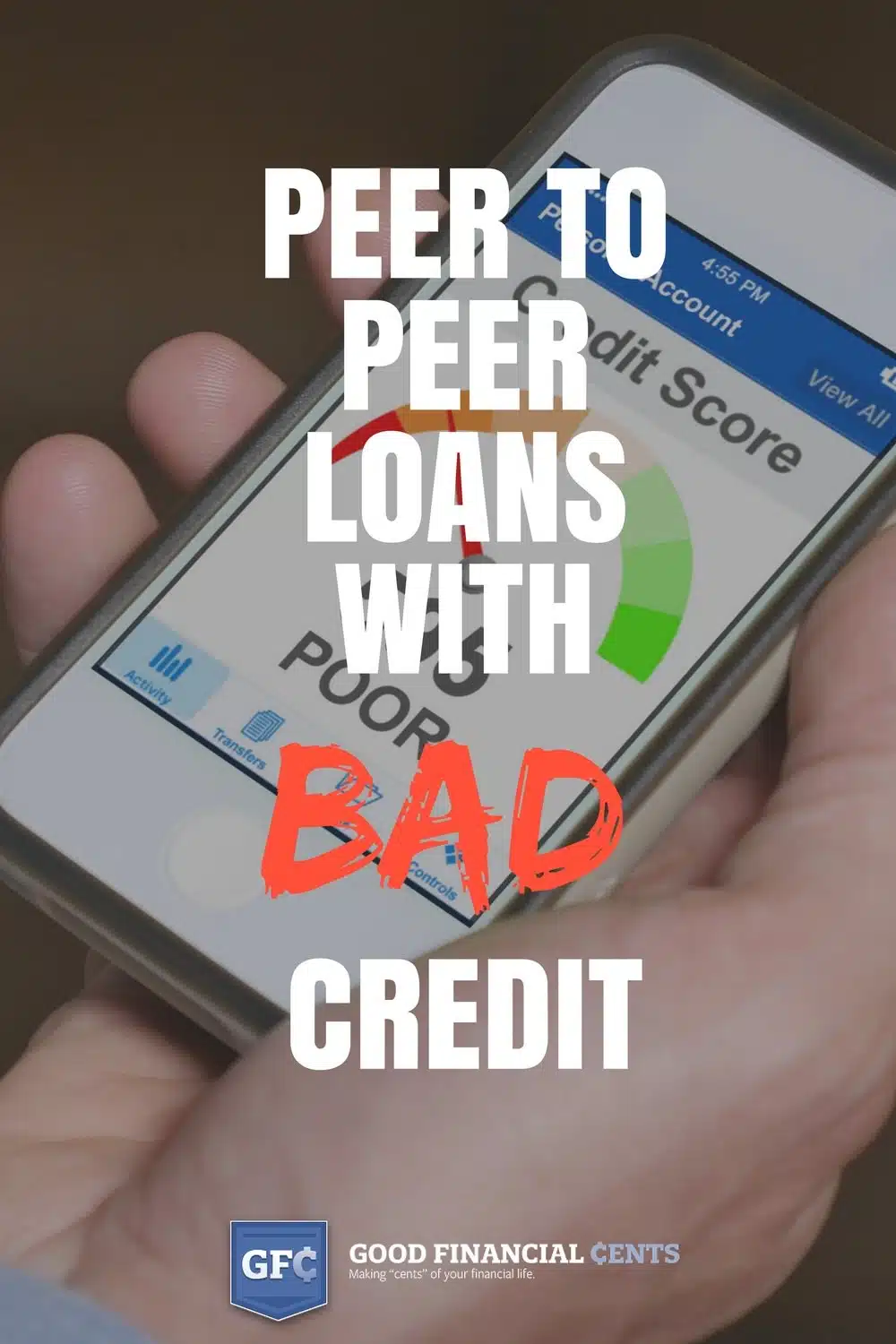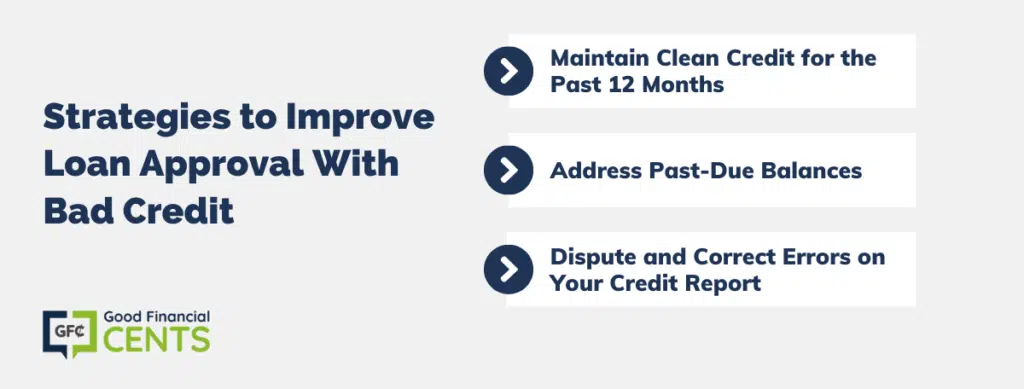Editor’s Note: Lending Club no longer offers peer-to-peer lending on its platform.
Peer-to-peer lenders are exploding on the scene, typically making unsecured personal loans to tens of thousands of borrowers for just about any purpose, and under terms that are often more favorable than what you can get through a bank, credit union, or other traditional loan source.

P2P platforms are also branching out into very specific lending niches. These can include business loans, mortgages, and student loan debt refinancing. They are also slowly tiptoeing into bad credit loans.
The progress on the bad credit has been relatively slow, but there are still opportunities to get loans from P2P platforms if you have credit that is – shall we say – less than “fair”, and sometimes even “bad”.
But in truth, bad loan lending is still a very new endeavor in the P2P space. But there is hope for the future – as investment interest on the platforms increases, particularly from institutional investors, it is just a question of time before more P2P platforms will be making bad credit loans.
So where is the industry at right now, and what can you do if you have bad credit?
Check To See If Your Credit Is Bad >>>
Table of Contents
Peer-To-Peer and Bad Credit Loans
It’s probably an exaggeration to use “P2P” and “bad credit” in the same sentence. Closer to the truth, is that there are P2P lenders who will work with people who have fair credit, and some will go a little bit below fair, but few will actually work with people who have credit levels that are generally recognized as “bad”.
There is a considerable amount of incorrect information in this regard. Many news sources and websites are mistakenly indicating that P2P lending platforms are THE place for people with bad credit to get loans, and that information is generally wrong.
It’s important to understand why this is the case. P2P lending platforms bring together borrowers and investors. Investors are the primary reason why P2P platforms generally don’t make loans available for people with bad credit.
If you come to a P2P platform as an investor, you’re going to be far less likely to invest your money in loans that are made to people with bad credit. Few investors come to P2P platforms looking to invest money in what are the private equivalent of “junk bonds”.
For that reason, and to keep investors coming to the platforms, P2P lenders impose lending standards, one of which is to sift out borrowers with poor credit.
Simply put, bad credit loans are not usually part of the mix when it comes to P2P sites.
We are going to highlight specific P2P lending platforms that lend with more liberal credit standards, as well as explain what the standards are for some of the more popular platforms.
The Big Two: Lending Club and Prosper
Though Lending Club and Prosper are by far the largest P2P lenders and the first choices of most who go to the P2P market looking for loans, they actually don’t score terribly well when it comes to making loans to people with bad credit. In fact, it would be far more appropriate to say that they limit their lending to those with no worse than fair credit.
As an example, Lending Club has a minimum credit score requirement of 660. Prosper goes a little bit lower, down to 640. That’s not much lower than banks and credit unions, who typically impose minimum credit scores of between 650 and 680.
In addition, both platforms have serious restrictions if your credit report reveals instances of bankruptcy, open judgments, or tax liens.
In general, if your credit falls below fair, then Lending Club and Prosper will not be likely sources for you to get a loan. In fact, the same can be said of the majority of P2P lenders. Since they attract individual investors, they lean in favor of borrowers with stronger credit histories, and are very unlikely to make loans to those with credit that is regarded as “bad”.
Peerform
Peerform is one of the few P2P lenders that makes loans to borrowers with what we might term “less than fair credit”. They don’t actually make loans if you have bad credit, but they have a more generous definition of fair credit than other P2P lenders.
Let’s start with credit scores. As noted above, other P2P lenders typically look for minimum credit scores of 640 or higher. Peerform will lend to borrowers with credit scores as low as 600.
That provides a good bit more breathing room on the credit score side, but Peerform still does not accept credit profiles with delinquencies, bankruptcies, tax liens, judgments, or non-medical related collections within the past 12 months. That describes a lot of people who have bad credit.
However, the lower credit score requirement could open the door to a loan approval if your bad credit episodes are substantially older than 12 months. And that could be a good thing because Peerform offers a lot of other benefits to those who have unconventional credit and income profiles.
For example, Peerform does not actually require that you have a job in order to get a loan. You do need to provide proof of income, but it can be Social Security, retirement income, or other forms of non-employment income.
They’re also pretty generous as far as your debt-to-income ratio (DTI), which is your monthly recurring debt obligations divided by your stable monthly income. They’ll accept a DTI of up to 40%, however, the DTI calculation does not include mortgage debt on your primary residence. That calculation is far more generous than what you’ll find with banks and other traditional loan sources.
Another important category where Peerform parts company with traditional banks is in the purpose of your loan. Peerform has a single loan category, which is personal loans. It can be used for just about any purpose, including debt consolidation, credit card refinancing, home improvement, major purchases, car financing, business purposes, medical expenses, moving and relocation, wedding expenses, vacation, home buying, or just about any other purpose you can think of.
This means that you can use a Peerform loan for an incredible number of purposes, thus eliminating the need to apply for specific loans for very specific purposes. For example, if you want to buy a car; you can use the proceeds of a Peerform personal loan to purchase that vehicle.
Peerform will make loans of between $1,000 and $25,000, with a repayment term of 36 months. These are fixed-rate, fixed-payment installment loans that will be fully paid off within the term. Yet another bonus is that the loans are completely unsecured – you never need to supply any type of collateral for a loan.
Peerform loan rates range from a low of 7.12% APR to a high of 29.99%. They also charge an origination fee equal to 5.00% of the loan amount. However, there is no application fee and no prepayment penalty.
DriverUp
As the name implies, DriverUp is a P2P lender that makes loans to purchase cars. Though that is a very specific purpose, the big advantage they offer is that they are one of the few P2P platforms available that actually will make bad credit loans.
Since the market for new car loans is so competitive, DriverUp focuses its efforts on providing loans to buyers of used vehicles, and typically those borrowers who have bad credit in particular. In fact, DriverUp’s average credit score is 535, and it will make loans to people who have even lower credit scores than that. Essentially, DriverUp lends to the automotive subprime market.
Unlike other P2P lending platforms, DriverUp loans do require collateral, which is the automobile that’s being purchased. Interest rates on those loans range between 8.00% and 24.95%.
If DriverUp has a limitation, it’s that you can get financing for car purchases only with dealers who actually operate through the platform. However, the platform has participation from hundreds of car dealers across the US. And since it is a relatively new platform, having only begun operations in 2015, it’s growing rapidly.
DriverUp also has an advantage over just about any other P2P platform in the way that it funds its loans. Typically, with P2P platforms, you have to fill out an application and then present your loan request to potential investors. This process can take up to two weeks, and there is no guarantee that your loan will be fully funded. That’s because P2P platforms are investor-funded, not bank-funded.
But on DriverUp, your loan will be funded by the DriverUp parent company. Once the loan is in place, it will be offered to investors to invest in. But you will have your loan immediately, and you will not have to concern yourself with raising the money from investors – or facing the risk that the loan may not be fully funded.
How to Improve Your Chance of Loan Approval With Bad Credit
Despite what you may have read or heard about the generosity of P2P lenders in making loans to people with bad credit, you can see that your options will be limited even in that space. But you always have the ability to improve your chance of getting loan approval with bad credit, even with P2P lenders.
If you do have what is generally regarded as bad credit, develop strategies to do the following:
- Be sure that your credit has been clean for at least the past 12 months – that means no delinquencies, no public records, and no past-due balances
- If you do have any past due balances, either pay them off completely or settle to have them removed by paying an agreed-upon amount that is less than the full balance due
- Dispute and remove any erroneous information on your credit report that may be having a negative impact on your credit score

There’s no magic bullet when it comes to fixing your credit quickly. But often with just a few tweaks, you can improve your credit just enough to get the kind of loan that you want. And of course one of the advantages of getting a loan through a P2P platform is that you can generally use the loan proceeds for any purpose that you want. That will never happen with a bank loan!
Have you tried applying for a loan with a P2P lender with either fair or bad credit? How did it work for you, and what would you recommend to someone else who is in the same situation?








Hi I need a loan of 2000-3500.
Iin March 2018 I was involved in a work injury . I broke my lower back.
I have been receiving work comp payment. But almost a year later I’m starting to fall behind.
Hi Britney – Apply to a P2P lender and see what happens. Also try a bank or credit union. You’ve got nothing to lose and they may accept your workers comp as income, as long as there’s a permanent income source when it ends, like a return to your job.
Very helpful.need help to apply for a loan for balance transfer on social security.
Hi Shirley – You should be able to qualify for a loan with Social Security income. It’s income like any other source.